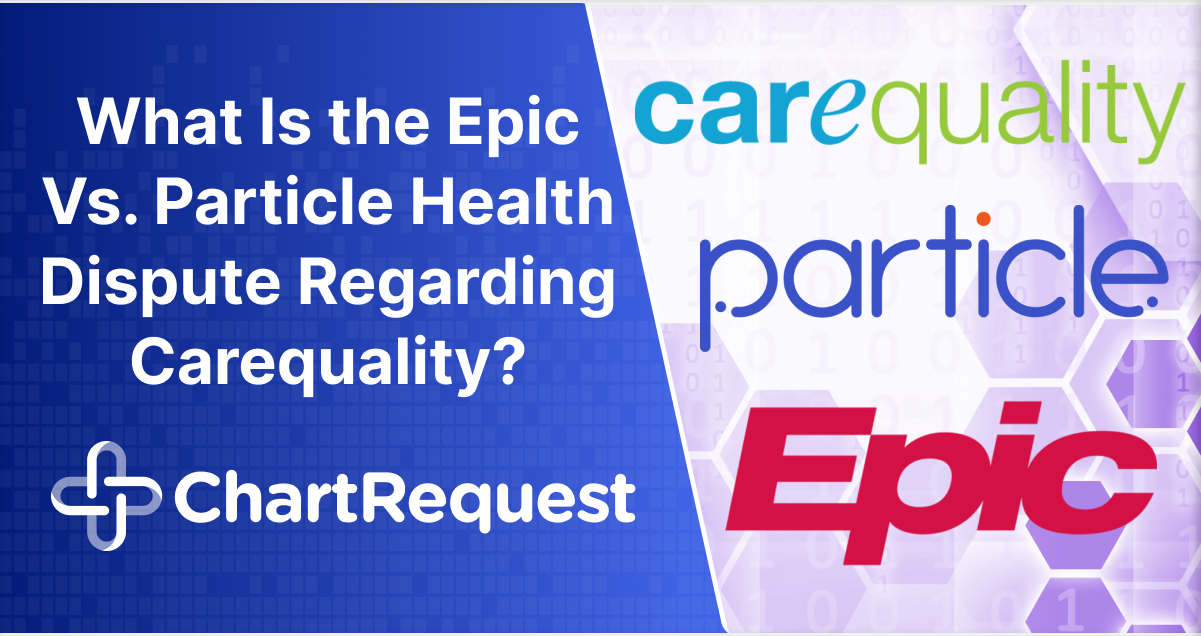If you are active in health IT, you may know about the friction between Epic vs. Particle Health regarding Carequality data access. If not, you’re in the right place.
This dispute stems from the recent decision by Epic Systems to stop responding to data requests from some Particle Health participants via Carequality. As you may suspect, this story is more than a simple grudge match between two companies. Professionals across the industry are asking questions including but not limited to:
- Why did Epic stop responding to queries from Particle Health participants?
- Were the impacted Particle Health participants violating Carequality policies?
- What will be the long-term ramifications of the Epic vs. Particle Health dispute?
Below, our team at ChartRequest unpacks the Epic vs. Particle Health controversy. Catch up with the story, then follow us on LinkedIn, Facebook, and X for more industry updates.
Who Are the Key Players in the Epic Vs. Particle Health Dispute?
Before we dive into the details, it’s essential to understand these two organizations, their values, and their roles. This section will provide brief, high-level breakdowns of each significant organization in the Epic vs. Particle Health dispute.
What Is Carequality?
To help explain the vision and mission of Carequality, we will briefly cover the conditions that necessitated their solution:

In the early days of electronic medical record systems (EMR), the Internet didn’t exist as we understand it today. Before TCP/IP connected computer networks widely in 1983, researchers worked tirelessly to create computer-to-computer communications.
During these developmental years, healthcare pioneers saw significant potential. Entrepreneurs began researching ways to use this new technology to drive innovation in the healthcare industry. Early users of the EMR praised its innovation, and new companies began working to create the ideal EMR system.
Unfortunately, companies created these systems in a vacuum, leading to vast data silos. In this context, these are collections of health information only compatible with the source EMR system.

Carequality is an interoperability framework designed to facilitate the exchange of medical records between health information networks and service platforms. As their network expands, Carequality aims to untangle the interoperability issues that date back over 50 years.
Additionally, to directly cite their website, “Carequality is a supporting partner of ONC’s Recognized Coordinating Entity (RCE), and in particular leading the development of the Qualified Health Information Network (QHIN) Technical Framework (QTF).”
What is Epic Systems?
Founded in 1979, Epic Systems is the most widely used EHR system in the United States. According to the company, hospitals in its network held 78% of US patients’ medical records in 2022.

Epic Systems boosts interoperability between its users with a functionality called Care Everywhere. Additionally, the organization was among the first to join the Carequality network to improve sharing between Epic and non-Epic users.
In addition to its immense EHR network, Epic Systems developed specialized functionalities to serve the entire healthcare industry.
To say Epic Systems is a major player in the healthcare industry would be an understatement. From 2019 to 2022, its revenue totaled nearly $15 billion. Moreover, the company boasts its distribution of $171 million to FQHCs, Safety Net Organizations, and other charity programs.
What is Particle Health?
Particle Health is a relatively new player in the healthcare industry. Founded in 2018 by Troy Bannister and Dan Horbatt, the company prides itself on being a best-in-class data transformation platform.

The company enables simple and secure access to actionable healthcare data with an API platform that aggregates and unifies healthcare records from thousands of sources. Their products include the RESTful API, allowing healthcare providers to access FHIR R4 or CCDA data when needed.
Particle Health closed a $12 million Series A in 2020, making them a powerhouse in the healthcare IT sector. According to the company, they want to be one of the most prominent innovators in health technology, building a developer-friendly platform for the entire healthcare ecosystem.
What Is the Epic Vs. Particle Health Dispute About?
As mentioned at the beginning of this article, the issue that led to the Epic vs. Particle Health dispute stems from Epic’s recent decision to cut off specific Particle Health participants from accessing its medical records using the Carequality interoperability network.
But why would Epic Systems make this decision?
Purpose of Use, Reciprocity, and the OBO Exception
To ensure the lasting health of the Carequality network, reciprocity and purpose of use are fundamental elements for secure and meaningful data exchange.
When an organization retrieves records via the Carequality network, it must submit its query with a purpose associated with their record retrievals from this list:
- Treatment
- Payment
- Health Care Operations
- Public Health Activities
- Patient Request
- Coverage Determination
- Other Authorization-Based Disclosures
Despite the guidelines citing seven purposes of use, Carequality only requires organizations to respond to requests for treatment, per the HIPAA definition of the term. This can lead to organizations inaccurately representing the purpose to guarantee a response.
On the other hand, reciprocity is a bit more self-descriptive. Barring specific exceptions, Carequality participants who wish to submit queries (or requests for records) must also respond to queries. To put it plainly, record sharing must go both ways.
Recently, Carequality also instituted a new reciprocity rule exception called the “On Behalf Of” (OBO) exception to empower health IT business associates to use the network. In other words, an organization is eligible for the OBO exception if healthcare providers utilizing their services primarily keep records in a separate system.
ChartRequest is an example of an organization that may access Carequality via the OBO exception because our platform neither produces nor derives new clinical information.
Once we launch our automated care coordination service, requestors will be able to implement our medical records exchange solution to submit retrieval queries via the network on behalf of healthcare providers.

In essence, if a Carequality participant creates medical records, they should expect reciprocity. If a participant does not create medical records, the OBO exception may apply.
What Led to Epic Systems’ Decision to Cut Off Certain Particle Health Participants?
Epic’s decision corresponds with the company’s concern that specific Particle Health participants may have fraudulently used the “Treatment” purpose of use to access patient records wrongfully.
In a third-party security and privacy risk notification, Epic Systems outlined the situation that led to them cutting off MDPortals, Reveleer, and Integritort. It also resulted in Epic filing a formal dispute with Carequality for three primary concerns:
- The named Particle Health participants pulling records for the Treatment use case may not be using the records for treatment.
- The named participants aren’t participating in reciprocity despite Epic’s objections to their OBO relationship with Particle Health.
- The named participants are pulling records via Carequality without transparency about provider-level connections.
To further explain this decision, Epic Systems shared a timeline that spans between October 2023 and April 2024.
Timeline Provided by Epic Systems
While the response may seem like a sudden decision, the Epic notification provides a rough timeline to explain their suspicions. This dates back to October 2023, and key highlights include:
- October 2023: Particle Health published thousands of new Carequality connections under the Treatment purpose of use. Epic’s Care Everywhere Governing Council determined that the Particle Health entries for MDPortals, Reveleer, and Integritort likely did not conform to a Treatment Permitted Purpose.
- October 2023 through April 2024: Several conversations between Particle Health, Epic, and Carequality occurred related to processing new entries and Particle Health’s implementer obligations.
- December 2023: Every Epic community member who reviewed the new Particle Health directories claiming OBO exceptions objected to them.
- March 2024: Epic Carequality admins noticed a surge of queries from the Particle Health gateway from November to December 2023. This coincided with the addition of MDPortals, Reveleer, and Integritort.
- March 21, 2024: Epic filed a formal complaint with Carequality and suspended the connection between the Particle Health gateway and Epic Systems.
- March 22, 2024: Either Particle Health or Integritort marked Integritort’s Carequality directory entry as inactive.
- March 28, 2024: Epic Carequality admins noticed Novellia, a personal health tool, claiming the Treatment purpose of use. The Care Everywhere Governing Council determined this was likely not the true purpose of use. They chose not to distribute the connection to the Epic community.
- April 4, 2024: Epic requested that Particle Health provide the information necessary to verify the Treatment purpose of use for its connections.
- April 8, 2024, and Ongoing: Epic has been working with Particle Health and Carequality to resolve the dispute, discuss a verification plan for new connections, and prevent fraudulent claims of the Treatment purpose of use.
What Has Particle Health Said About the Epic Vs. Particle Health Dispute?
After reports began circulating about the suspension of Particle Health’s connection with Epic Systems via Carequality, the company released three statements to address the issue.
Particle Health Statement 1
April 9, 2024: Particle’s initial statement about the Epic Vs. Particle Health dispute came one day before Epic’s notification, and it acknowledged Epic’s decision to stop responding to certain requests submitted via Carequality. In this statement, Particle Health touched upon the potential impact on patient care this decision may cause.
“This decision has negatively impacted thousands of patients, and potentially puts 6 million+ patient encounters per year at risk. We believe strongly that this unilateral action is a violation of Carequality’s terms and conditions and is sufficiently important to the treatment of patients to address this matter publicly.”
Particle Health then expressed that, to their knowledge, all impacted participants directly support patient services and practice reciprocity with the data they create. The company also highlighted sudden disconnection’s impact on the perceived trust of the Carequality network.
Particle Health Statement 2
April 12, 2024: In response to the notification Epic released on April 10, Particle Health shared a second statement to provide their side of the Epic vs. Particle Health dispute. This statement is a bit longer, so let’s unpack some of the significant themes Particle Health discussed.
“We have always responded rapidly and robustly to data-supported complaints through appropriate channels. There is no debate about this fact.”
One of the primary messages in this second statement concerns Epic’s perception of Particle Health. Specifically, the quote from Epic’s notification that states Particle “might not be fulfilling its obligations as a Carequality implementer.”
In this statement, Particle highlighted its rigorous onboarding process and prompt investigation of complaints. Additionally, Particle noted that Carequality had not shared concerns about Particle Health participants and that HHS specifically tasked Carequality with facilitating health data exchanges.
“While we have followed all guidelines and consistently acted in good faith, there is, in fact, no standard reference to assess the definition of Treatment nor the application of the definition of treatment as it pertains to data requests.“
While Particle Health acknowledged its appreciation for Epic’s collaboration in resolving this issue, the company also noted its grievances with systemic issues. In addition to the blurred lines surrounding the treatment purpose of use, Particle noted a similar issue impacting the growth of value-based care.
Finally, Carequality’s decision to cease determining use case validity in October 2023 has created a vacuum.
“There is no unbiased successor to their role, which presents an opportunity for abuse of power by actors in the system.”
Particle Health closed this statement by calling for clear “rules of the road” to prevent biased decision-making conflicts in the future.
Particle Health Statement 3
April 15, 2024: In its third statement about the Epic vs. Particle Health dispute, Particle reiterated its dedication to restoring service from Epic Systems to its participants and provided a progress update.
At the beginning of this statement, Particle Health acknowledges that most of its participants have not faced issues requesting data. The problem does, however, seem to extend beyond the organizations named in Epic’s release.
“While there is an ongoing dispute between Epic and Particle Health, related to three specific customers, the significant majority of Particle Health customers impacted by Epic’s actions were not in any way related to this dispute.”
Particle Health goes on to highlight their continued efforts to restore connections for their impacted customers.
“Particle Health maintains an ongoing, constructive dialog with Carequality, consistently adhering to all guidelines.”
In closing, this statement highlights a quote from Jason Prestinario, CEO of Particle Health. In these brief quotes, Prestinario states the company’s dedication to “enable safe and effective access to medical records to facilitate better patient care.”
Until this dispute ends, Particle Health will continue to work through the Carequality procedural channels
Who Is Right in the Epic Vs. Particle Health Dispute?
While it can be comforting to break down the actions of one side to be right and the other side to be wrong, this dispute is currently too complex for such a black-and-white breakdown.
Ultimately, both organizations in this dispute believe they’re doing what’s best for the patients and providers they serve. Let’s break down some of the nuance that has people picking sides in the Epic vs. Particle Health dispute.
Why Are Some People Siding With Epic Systems?
Epic acted in a way it thought was essential to protect the privacy of patient data and prevent fraudulent and/or unfounded attribution of the Treatment purpose of use to force the release of medical records.
While Particle Health claims that the organization is failing in its promise to protect the patient experience, Epic cites the ongoing loyalty of returning and happy users as a testament to their data quality and security.
Why Are Some People Siding With Particle Health?
Particle Health is acting in the best interests of the healthcare providers whose patients’ care could suffer if the largest EHR system doesn’t reconnect their Carequality service.
The company reiterates that it provides top-end data protection during migrations and follows all regulatory guidelines in the process. Particle Health believes that Epic Systems is making a concerted effort to impede its practices and misinform users about its onboarding and procedures.
What Does the Epic Vs. Particle Health Dispute Mean for Healthcare?
Whether you choose a side in the Epic vs. Particle Health dispute or not, it’s safe to say this incident may likely lead to changes surrounding:
- The specific definition of Treatment as a purpose of use in the context of Carequality exchange
- Broadening the list of use purposes for which a response is mandatory
- Assigning an unbiased entity to handle disputes between Carequality participants
If you’d like a deeper dive into the Epic vs. Particle Health dispute, we highly recommend you review Brendan Keeler’s breakdown for Healthapiguy. For even more information, he created a follow-up article that breaks down secondary use, fraud, and more.
As a Carequality participant and avid supporter of patient rights and provider data exchange, ChartRequest is keeping a finger on the pulse of this dispute.
Learn how ChartRequest innovates a better PHI exchange experience.
If you’d like to stay up-to-date on the Epic vs. Particle Health dispute and other healthcare news, we welcome you to connect with us on LinkedIn, Facebook, and/or X.
Want to be the first to know about our Care Coordination solution powered by the Sequoia Directory, Carequality, and our existing network of over 10,000 trusted providers? Please click the button below and sign up to receive a notification as soon as it’s ready!



